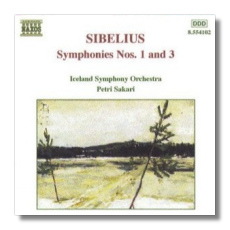
The Internet's Premier Classical Music Source
Related Links
- Sibelius Reviews
- Latest Reviews
- More Reviews
-
By Composer
-
Collections
DVD & Blu-ray
Books
Concert Reviews
Articles/Interviews
Software
Audio
Search Amazon
Recommended Links
Site News
 CD Review
CD Review
Jean Sibelius

Symphonies #1 & 3
- Symphony #1 in E minor, Op. 39 (1899)
- Symphony #3 in C Major, Op. 52 (1907)
Iceland Symphony Orchestra/Petri Sakari
Naxos 8.554102
"… music begins where words leave off." - Sibelius
I had intended for this to be a short review. You know the saying, "so it goes." After writing one paragraph, another grew. Then I spent an evening listening to these performances once again, this time while reading Steinberg's comments in his book, The Symphony. That was where I came across Sibelius' comment. I will continue by reporting the initial notations I made as I began to write after several listenings.
This disc is an awesomely auspicious opening to what I assume will be a new Naxos Sibelius cycle. (The previous one was with Adrian Leper and the Slovak Philharmonic. I did not hear that cycle.) This disc made me hear Sibelius'music anew. I haven't felt this sense of discovery since the initial one with Colin Davis' cycle when it was issued on LP in the 70s. To make sure I wasn't just fooling myself, I got out the latest Davis cycle on RCA and the Lahti Orchestra recording on BIS. Both have had rave reviews and I commented positively on the Davis London Symphony cycle myself. This recording of Symphony #1 leaves the others in the dust. The opening clarinet solo is riveting. I haven't heard anything as plaintive since Stokowski's stereo recording now on Sony. The rumble of the timpani under the clarinet at those opening moments is literally moving. The rest of the performance and recording are just as compelling. In fact, the more I listen to this recording, the more Stokowski's comes to mind. While the timings of the second movement are significantly different (Stokowski is longer) the spirit is the same even there. There is so much to enjoy here I'll let you discover it for yourself.
The Third Symphony is no less overwhelming. Again, I compared it with Sir Colin's London Symphony cycle. Again, the Naxos recording is better and the interpretation simply staggering. To be honest, at this point, even after many, many listenings, my notes are just one "WOW" after another. I am certain that this recording will become my paradigm for future listenings of both works. This is not just good for the price, I think you will find, as I did, that this is an almost overwhelming experience.
These same forces recorded Madetoja's Symphonies for Chandos a few years ago. In fact one of the sound engineers for the Chandos recording also worked on this one. The sound here is really excellent with excellent sound stage and relief. The Davis, by comparison, is woolly and distant. Details heard on this Naxos disc are just not there in the RCA recording. Davis' interpretations of these specific items are, by comparison, predictable where Sakari is exciting.
The bottom line is that in Sakari's hands these works have a Life Force, a pulse that will carry you into the world of Sibelius. I have noticed of late that all of the Naxos recordings seem to have particularly wonderful woodwind and harp work. This is the case in these symphonies, too. The sound overall is warm and reverberant in just the right degree. Attacks are sharp, right on! I can't wait for the next installment. For now, I will retire my Davis recordings to the wine cellar.
Post Script: Life is a process of discovery and things anew, or else. Life is a pulse, a beat, a rhythm, or else. "If your parents had no emotion…" as Stokowski put it. This recording has it and I have learned something about life, music and writing sentences for having listened.
Copyright © 1999, Robert Stumpf II


















